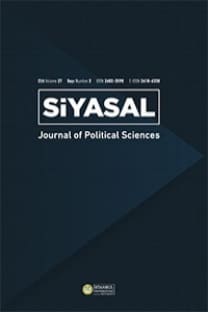Crisis and Corruption in Spain: Improving the Quality of Governance to Fight Corruption
Crisis and Corruption in Spain: Improving the Quality of Governance to Fight Corruption
Corruption, Spain, Quality of government, institutional reforms public trust,
___
- Alcalá F. & Jiménez F. (2018) Los costes económicos del déficit de calidad institucional y la corrupción en España. Bilbao: BBVA Foundation.
- CoE (2003) Recommendation of the Committee of Ministers to member states on common rules against corruption in the funding of political parties and electoral campaigns. Rec(2003)4. (Online) http://www.coe.int/t/dghl/cooperation/economiccrime/cybercrime/cy%20activity%20interface2006/rec%202003%20%284%29%20pol%20parties%20EN.pdf
- García-Quesada M., Jiménez F., & Villoria M. (2013). Building Local Integrity Systems in Southern Europe: The case of urban local corruption in Spain. International Review of Administrative Sciences, 79(4), 618-637.
- García-Quesada M. Jiménez F., & Villoria M. (2015). Can't control/won't control: opportunities and deterrents for local urban corruption in Lanzarote. Crime, Law and Social Change, 63(1-2), 1-20.
- García Viñuela E., & Artés J. (2008). Reforming Electoral Finance in the Nineties: A Case Study of Spain. European Journal of Law and Economics, 25, 177-190.
- García Viñuela E., & González de Aguilar C. (2014). "Party financing and rent-seeking: an analysis of the 2007 and 2012 Spanish political financing reforms. Revista Española de Ciencia Política, 34, 145-165.
- GRECO (2009). Evaluation Report on Spain: Transparency of Party Funding. Strasbourg: Council of Europe. (Online) http://www.coe.int/t/dghl/monitoring/greco/evaluations/round3/GrecoEval3(2008)3_Spain_Two_EN.pdf
- GRECO (2011). Compliance Report on Spain. Strasbourg: Council of Europe. (Online) http://www.coe.int/t/dghl/monitoring/greco/evaluations/round3/GrecoRC3(2011)5_Spain_EN.pdf
- GRECO (2013). Second Compliance Report on Spain. Strasbourg: Council of Europe. Online: http://www.coe.int/t/dghl/monitoring/greco/evaluations/round3/GrecoRC3(2013)20_Second_Spain_EN.pdf Jiménez F. (2007b). Escándalos de corrupción y defectos de la financiación de los partidos políticos en España: situación actual y propuestas. Studia Politicae, 12, 67-90.
- Jiménez F. (2009). Building Boom and Political Corruption in Spain. South European Society and Politics, 14(3), 255-272.
- Jiménez F. (2014). "La corrupción en un país sin corrupción sistémica: un análisis de los casos Bárcenas, Palau y ERE" (Corruption in a country without systemic corruption: an analysis of the Bárcenas, Palau and ERE cases). In J. Estefanía (ed.), Informe sobre la democracia en España/2014. Madrid: Fundación Alternativas. Pp. 165-187.
- Jiménez F. (2018). "Política, dinero y corrupción". In: V. Lapuente (ed.), La corrupción en España. Madrid: Alianza.
- Jiménez F. (2020). El déficit de calidad institucional y la mala regulación: la importancia de mejorar la normativa, Anuario del Buen Gobierno y la Calidad de la Regulación, 2019, 61-85.
- Jiménez F. García-Quesada M., & Villoria M. (2014). Integrity systems, values and expectations. Explaining differences in the extent of corruption in three Spanish local governments. International Journal of Public Administration, 37(2), 67-82.
- Jiménez F., & Villoria M. (2018) "Party Funding in Spain", in Mendilow J. & Phelippeau E. (eds), Handbook of Political Party Funding. Cheltenham: Edward Elgar.
- Lapuente V. (2016), La corrupción en España. Un paseo por el lado oscuro de la democracia y el gobierno, Madrid, Alianza.
- Mungiu-Pippidi A. (2016). The Good, the Bad and the Ugly: Controlling Corruption in the European Union. Hertie School of Government, available at: http://anticorrp.eu/publications/the-good-the-bad-and-the-ugly-controlling-corruption-in-the-european-union-3/.
- North D. C., & Thomas R. P. (1973). The Rise of the Western World: A New Economic History. Cambridge, Cambridge University Press.
- North D. C. (1990), Institutions, Institutional Change, and Economic Performance, New York, Cambridge University Press.
- Palau A. & Davesa F. (2013). El impacto de la cobertura mediática de la corrupción en la opinión pública española. REIS, 144, 97-126.
- Pérez-Francesch J. L. (2009). La financiación de los partidos políticos en España: Consideraciones a partir de los informes del Tribunal de Cuentas y de la nueva ley orgánica 8/2007, de 4 de Julio. Papers, 92, 249-271.
- Ramió C. (2016), La renovación de la función pública: estrategias para frenar la corrupción política en España, Madrid, Libros de la Catarata.
- Romero J. Jiménez F., & Villoria M. (2012). (Un)sustainable territories: Causes of the speculative bubble in Spain (1996-2010) and its territorial, environmental and socio-political consequences. Environment and Planning C. Government & Policy, 30, 467-486.
- Rusciano F. (2014) "The Meaning of Corruption in World Opinion". In Corruption in the Contemporary World, Mendilow J. & Peleg I. (eds). London: Lexington Books: 27-46.
- “Sansón Carrasco” (2014). ¿Hay Derecho? La quiebra del Estado de derecho y de las instituciones en España, Barcelona, Península.
- Sotiropoulos D. (2006). "Patronage in South European bureaucracies in the 1980s and the 1990s: The politicization of central public administrations in Greece, Italy, Portugal and Spain". Paper presented at the workshop "Political parties and patronage", ECPR joint sessions, Nicosia, 25-30 April 2006.
- Tribunal de Cuentas (2006). “Moción sobre el control interno, llevanza de la contabilidad, gestión de personal y contratación en las entidades locales”, aprobada por el Pleno del Tribunal de Cuentas en su sesión del 20 de julio de 2006. (En línea) https://www.boe.es/boe/dias/2007/04/05/pdfs/A14883-14889.pdf
- Villoria M. (ed.) (2012). El marco de integridad institucional en España. Situación actual y recomendaciones. Valencia: Tirant Lo Blanch.
- Yayın Aralığı: Yılda 2 Sayı
- Başlangıç: 1983
- Yayıncı: İstanbul Üniversitesi
Etnik Ayrımcılığın İnsan Ticaretini Önleme Üzerine Etkisi
Türkiye’de Belediyelerin Karar Alma Süreçlerine STK’ların Aktif Katılımının Ölçülmesi
Erdal EROĞLU, Gülçin TUNÇ, Mine AYDEMİR
Bengi DEMİRCİ, Nilüfer GÜRER BİLDİK
Marc SMYRL, Ceren ARK YILDIRIM
Crisis and Corruption in Spain: Improving the Quality of Governance to Fight Corruption
Social Networks and Democracy: Problems and Dilemmas of Regulating the Digital Ecosystem
